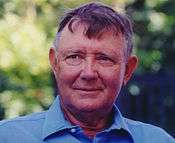Bob Armstrong (politician)
| Bob Armstrong | |
|---|---|
 | |
| 24th Commissioner of the General Land Office | |
|
In office January 12, 1971 – January 4, 1983 | |
| Governor |
Preston Smith (1971-1973) Dolph Briscoe (1973-1979) Bill Clements (1979-1983) |
| Preceded by | Jerry Sadler |
| Succeeded by | Garry Mauro |
| Member of the Texas House of Representatives from current District 82 | |
|
In office November 23, 1963 – January 12, 1971 | |
| Preceded by | Jack Ritter |
| Succeeded by | John Whitmire |
| Personal details | |
| Born |
Robert Landis Armstrong November 7, 1932 Austin, Texas |
| Died |
March 1, 2015 (aged 82) Austin, Texas |
| Resting place | Texas State Cemetery |
| Political party | Democratic |
| Spouse(s) | Linda Lee Aaker Armstrong |
| Residence | Austin, Texas |
| Alma mater | University of Texas School of Law |
| Military service | |
| Allegiance |
|
| Service/branch |
|
| Years of service | 1950–1953 |
| Rank | Ensign |
| Battles/wars | Korean War |
Robert Landis Armstrong, known as Bob Armstrong (November 7, 1932 – March 1, 2015),[1] was a Democratic politician and an environmental activist from the U.S. state of Texas. He was a member of the Texas House of Representatives from 1963 to 1971,[2] Commissioner of the General Land Office from 1971 to 1983, and a member of the Texas Parks and Wildlife Commission from 1985 to 1991. From 1993 to 1998, he was the assistant secretary for land and minerals management at the United States Department of the Interior under appointment of U.S. President Bill Clinton.[1]
Early years
Bob Armstrong was the son of the late Robert C. Armstrong and the former Louise Landis. He married the former Linda Lee Aaker, a lobbyist also from Austin.[3]
He received his Bachelor of Arts from the University of Texas and his LL.B. from the University of Texas School of Law, both in his native Austin. While at UT, Armstrong was a member of the service organization known as the Texas Cowboys. He served during the Korean War as an ensign in the United States Navy.
Political career
On November 9, 1963, Armstrong won a special election to the Texas House of Representatives for a part of Travis County, including the capital city of Austin. The vacancy was created by the resignation of fellow Democrat Jack Ritter. Coincidentally, Armstrong was to have been sworn into office on November 22, 1963, the day of the assassination of John F. Kennedy in Dallas. Instead, his swearing-in was delayed until the following day. He remained a representative until January 1971. In his last two terms, he also represented neighboring Burnet County.[2]
In 1970, Armstrong was elected the Commissioner of the General Land Office to succeed long-term incumbent Jerry Sadler. He was Land Commissioner for twelve years until 1983.[4] While Land Commissioner he became interested in acquiring the Big Bend Ranch for the State. He was finally able to achieve this in 1988 as a member of the Texas Parks and Wildlife Commission.
In the spring of 1982, Armstrong ran for the Democratic gubernatorial nomination against Texas Railroad Commissioner Buddy Temple and then Attorney General Mark White and lost, having finished third in the primary. As the party nominee, White then unseated Republican Governor Bill Clements in the 1982 general election. In 1985, Governor White appointed Armstrong, his former intraparty opponent, to the Texas Parks and Wildlife Commission.[5]
President Clinton nominated Armstrong to serve in the Department of the Interior. After he left that position in 1998, Armstrong remained active in the environmental community and sought greater funding for Texas parks and wildlife. He was a board member of the non-profit law firm, Trustees for Alaska.[1]
Subsequent Republican land commissioner Jerry E. Patterson said of Armstrong: "He was just a good guy. Just an extremely pleasant smiling guy even if he disagreed with your point of view. ... He was a lover of Texas."[1]
Armstrong appeared in January 2015 at the swearing in of current land commissioner George P. Bush, along with earlier commissioners Patterson, David Dewhurst, and Garry Mauro. The Texas Senate adjourned in Armstrong's honor on March 1, 2015.[1] He is interred at the Texas State Cemetery in Austin.
Bob Armstrong dip
Armstrong holds a distinction in that he has a dip named after him. Matt's El Rancho restaurant in Austin named a concoction of queso, guacamole, taco meat, and other ingredients "Bob Armstrong dip."[5]
References
- 1 2 3 4 5 Ryan McCrimmon of The Texas Tribune, "Former state official dies at 82", Laredo Morning Times, March 3, 2015, p. 10A
- 1 2 "Bob Armstrong". Texas Legislative Reference Library. Retrieved March 3, 2015.
- ↑ "Paul Burka "Power", December 1987". Texas Monthly. Retrieved September 15, 2013.
- ↑ Garry Mauro, The Land Commissioners of Texas: 150 years of the General Land Office (Austin: Texas General Land Office, 1986)
- 1 2 Christy Hoppe. "Former Texas Land Commissioner Bob Armstrong dies". Dallas Morning News. Retrieved March 3, 2015.
| Political offices | ||
|---|---|---|
| Texas House of Representatives | ||
| Preceded by Jack Ritter |
Member of the Texas House of Representatives from District 82 (Austin) 1963–1971 |
Succeeded by John Whitmire (redistricted) |
| Preceded by Jerry Sadler |
Commissioner of the General Land Office 1971–1983 |
Succeeded by Garry Mauro |
| Preceded by David C. O'Neal |
Assistant Secretary of the Interior for Land and Minerals Management 1993–1998 |
Succeeded by Sylvia Baca |
